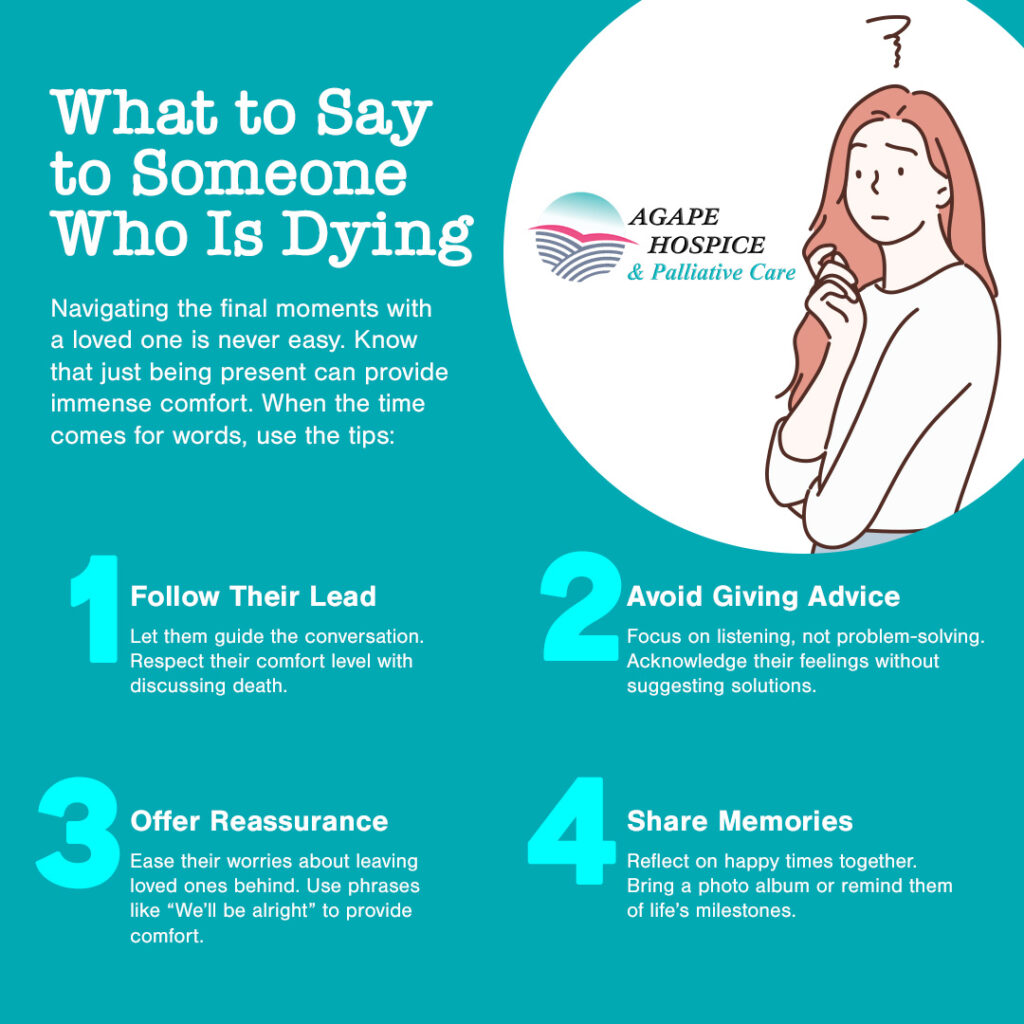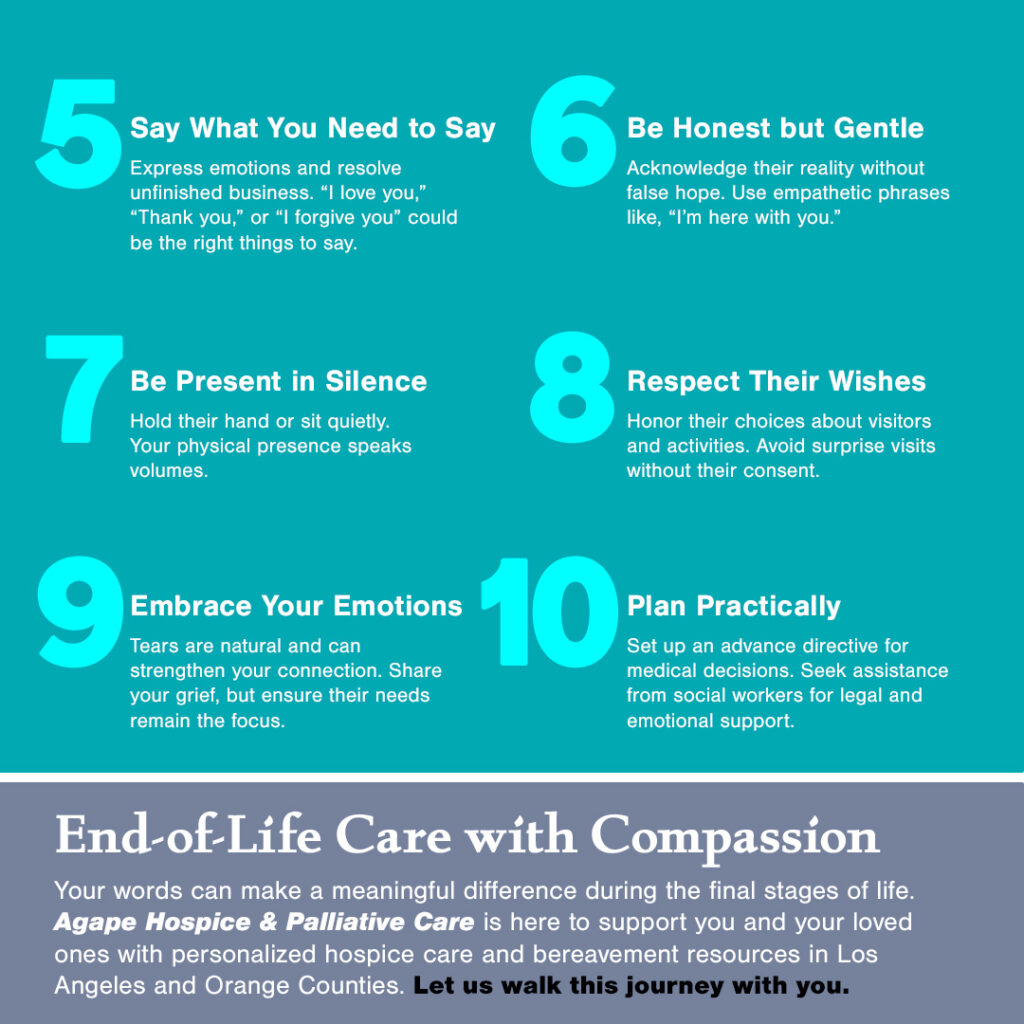What to Say to a Dying Person
What to Say to a Dying Person
Facing a loved one’s approaching death is one of the most challenging experiences you can go through. Finding the right things to say can feel impossible when someone you care about is nearing the end of their life. However, your words and even merely your presence can offer comfort during this time. If you’re wondering how to talk to someone who is dying, whether they’re in hospice or simply nearing the end, use these tips to guide you.
Follow Their Lead
Let them guide the conversation when interacting with a person on their deathbed. Some people wish to talk openly about death, in which case you should listen with compassion. Others may prefer to avoid the topic altogether. Be sensitive to their cues, respect their choice, and respond accordingly.
Refrain from Offering Advice
When speaking with a dying loved one, resist the urge to offer unsolicited advice. While well-intentioned, advice can sometimes come across as dismissive or even burdensome, especially if the person struggles to process their emotions and situation. Instead of suggesting solutions or offering opinions, focus on listening and being present. Remember, this time is about their needs, not about fixing the situation.
Offer Reassurance and Comfort
One of the most valuable things you can do is offer reassurance. Many dying people worry about what will happen to their loved ones after they’re gone. While it’s important to express your emotions, be careful not to overwhelm the dying person with your grief or fears about the future. Let them know that you’ll be okay and that their loved ones will be taken care of. Simple phrases like “We’ll be alright” and “We have it taken care of” can provide immense relief.
Reminisce About Shared Memories
Talking about happy times can be a comforting way to connect with someone who is dying. Encourage them to share stories about their past and talk about people who were significant to them. If they’re at a loss, remind them of their accomplishments, bring up joyous occasions you’ve shared, and emphasize their positive impact on your life. You might even bring a photo album to look at together. Such reminiscing brings comfort in the moment and helps preserve their dignity as they reflect on a life well-lived. Chances are you’ll think of humorous memories to share, leaving you both smiling and laughing.
Say What You Need to Say
If there are things left unsaid between you and the person who is dying, now is the time to express them. Waiting until the last minute may lead to regret, so express your feelings sooner rather than later. Whether it’s saying “Thank you,” “I love you,” “I forgive you,” or “Please forgive me,” these words can bring peace and closure to both of you. Even if the person is unresponsive, don’t shy away from speaking your heart—hearing is often the last sense to fade.
Be Honest but Gentle
If the person who is dying brings up the topic of their impending death, respond with honesty but also with gentleness. Acknowledge their reality without giving false hope. For example, if they express concerns about their symptoms or what comes next, you might say, “It must be hard to feel this way. I’m here with you,” or “I wish things were different, but I’m here to help with whatever you need.”
Be Present, Even in Silence
Sometimes, words aren’t necessary. Simply being present—holding their hand and sitting quietly by their side—can be more powerful than you might imagine. Physical touch often speaks louder than words, conveying love and support when you can’t find the right thing to say. Your presence alone often provides the reassurance they need.
Respect Their Wishes
As death nears, respect the dying person’s wishes about whom they wish to see and how they want to spend their time. Feel free to ask if they want anyone in particular to visit—perhaps a religious leader, a friend with whom they’ve lost contact or even an estranged family member. On that note, don’t assume they want to see a specific person and attempt to plan a surprise visit. Being mindful of how your loved one might react to certain visitors is the key to maintaining a peaceful environment. Keep their comfort and preferences at the forefront of any decisions.
Don’t Shy Away from Tears
You may be tempted to hold your emotions back, to put on a brave face for your loved one, but tears are a natural response to the grief of losing someone you love. Besides, crying together and showing vulnerability may strengthen your bond in those final moments. Just be sure that your emotions don’t overshadow the dying person’s needs.
Set Up an Advance Directive
Preparing for the end of life involves more than just emotional conversations; it also requires practical planning. One crucial step is setting up an advance directive outlining your loved one’s wishes for medical treatment if they become unable to communicate them. If this important legal document hasn’t been set up yet, make it a top priority to ensure your loved one receives end-of-life care that aligns with their values and wishes. The social workers at Agape Hospice & Palliative Care can assist with this and other end-of-life services.
Seek End-of-Life Care and Bereavement Support
Knowing what to say when someone is dying isn’t always easy, but your words and presence can provide much-needed comfort. At Agape Hospice & Palliative Care, we assist your loved ones with end-of-life care and offer bereavement support to families during this delicate time. As a locally owned and nationally accredited hospice provider serving LA and Orange County, we provide personalized care that goes above and beyond for our patients. Contact us today for help on every step of this difficult journey.
Contact Us



